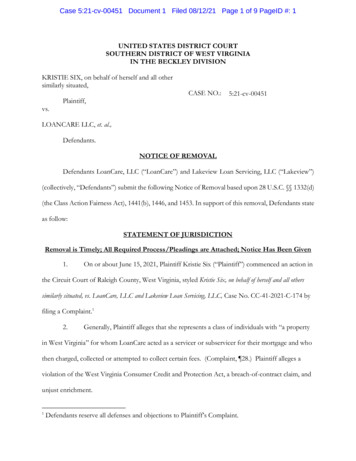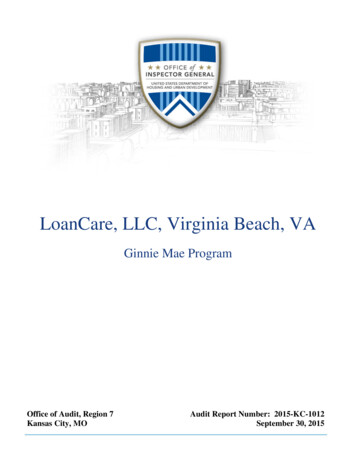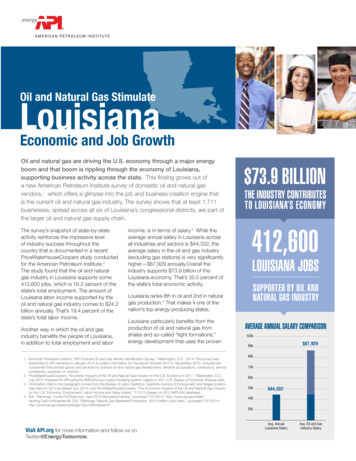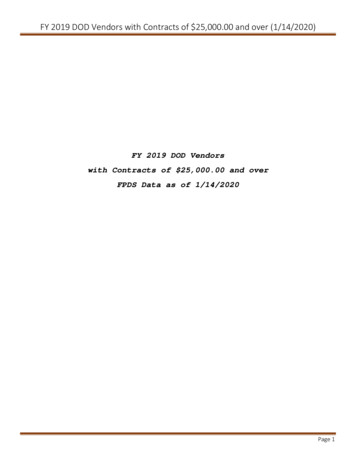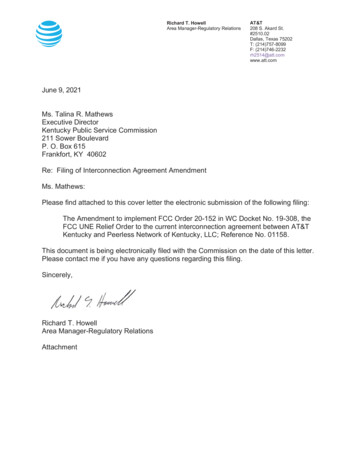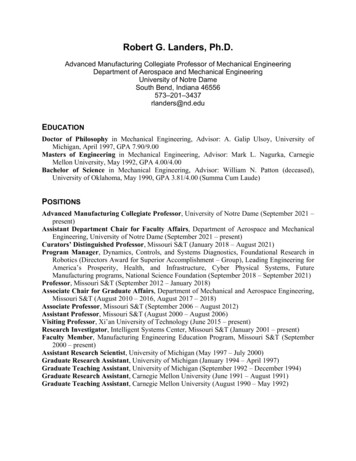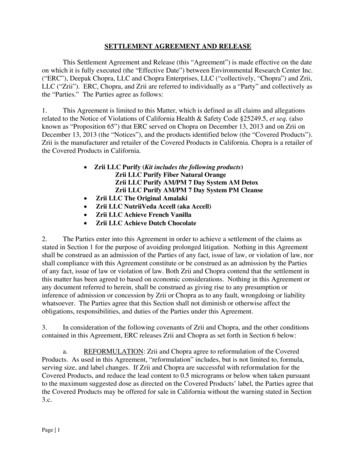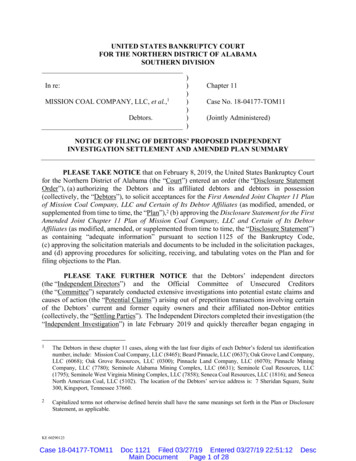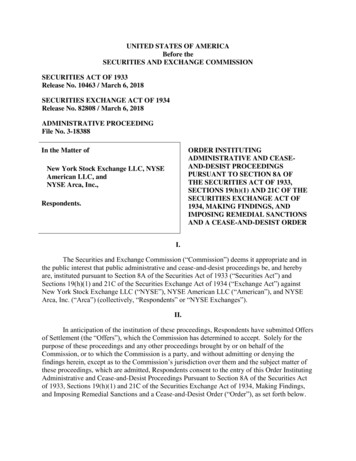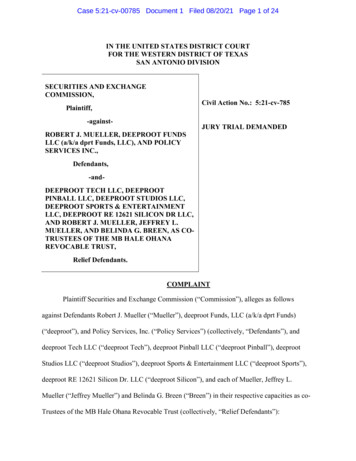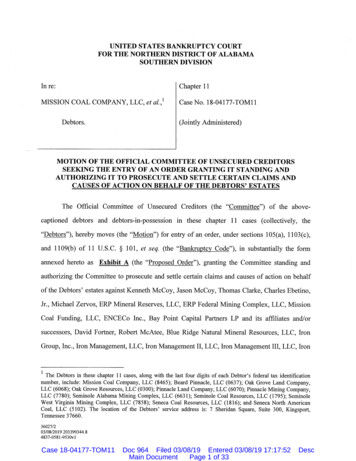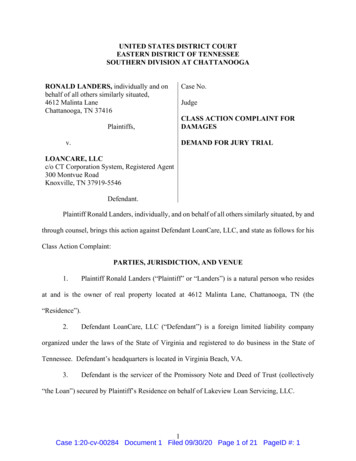
Transcription
UNITED STATES DISTRICT COURTEASTERN DISTRICT OF TENNESSEESOUTHERN DIVISION AT CHATTANOOGARONALD LANDERS, individually and onbehalf of all others similarly situated,4612 Malinta LaneChattanooga, TN 37416Plaintiffs,Case No.JudgeCLASS ACTION COMPLAINT FORDAMAGESDEMAND FOR JURY TRIALv.LOANCARE, LLCc/o CT Corporation System, Registered Agent300 Montvue RoadKnoxville, TN 37919-5546Defendant.Plaintiff Ronald Landers, individually, and on behalf of all others similarly situated, by andthrough counsel, brings this action against Defendant LoanCare, LLC, and state as follows for hisClass Action Complaint:PARTIES, JURISDICTION, AND VENUE1.Plaintiff Ronald Landers (“Plaintiff” or “Landers”) is a natural person who residesat and is the owner of real property located at 4612 Malinta Lane, Chattanooga, TN (the“Residence”).2.Defendant LoanCare, LLC (“Defendant”) is a foreign limited liability companyorganized under the laws of the State of Virginia and registered to do business in the State ofTennessee. Defendant’s headquarters is located in Virginia Beach, VA.3.Defendant is the servicer of the Promissory Note and Deed of Trust (collectively“the Loan”) secured by Plaintiff’s Residence on behalf of Lakeview Loan Servicing, LLC.1Case 1:20-cv-00284 Document 1 Filed 09/30/20 Page 1 of 21 PageID #: 1
4.This Court has original jurisdiction over this action pursuant to 28 U.S.C. §1332(d)(2), as Plaintiff and Defendant have diversity of citizenship, Plaintiff brings this case as aclass action, the proposed Class consists of at least one hundred (100) members, and the matter incontroversy exceeds the sum or value of five million dollars ( 5,000,000), exclusive of interestand costs.5.This Court has alternatively has jurisdiction pursuant to 28 U.S.C. 1331 as thisaction arises under the Dodd-Frank Wall Street Reform and Consumer Protection (“DFA”), theReal Estate Settlement Procedures Act, 12 U.S.C. 2601, et seq. (“RESPA”).6.This Court has supplemental jurisdiction to hear any and all state law claims thatare plead herein or that may subsequently arise pursuant to 28 U.S.C. §1367.7.Venue lies in this District pursuant to 28 U.S.C. § 1391(b) as a substantial part ofthe events or omissions giving rise to the claims asserted herein occurred within the EasternDistrict of Tennessee.SUMMARY OF CLAIMS8.This action is filed to enforce regulations promulgated by the Consumer FinanceProtection Bureau (“CFPB”) and implemented pursuant to section 6(f) of RESPA which becameeffective on January 10, 2014, specifically, 12 C.F.R. §§ 1024.35, 1024.36, and 1024.41 ofRegulation X as well as 12 C.F.R. 1026.1, et seq. a.k.a Regulation Z.9.In January 2013 the CFPB issued a number of final rules concerning mortgagemarkets in the United States, pursuant to the DFA, Public Law No. 111-203, 124 Stat. 1376 (2010).10.Specifically, on January 17, 2013, the CFPB issued the RESPA (Regulation X) andTILA Regulation Z Mortgage Servicing Final Rules, 78 F.R. 10695 (Regulation X) and 78 F.R.10901 (Regulation Z) which became effective on January 10th, 2014.2Case 1:20-cv-00284 Document 1 Filed 09/30/20 Page 2 of 21 PageID #: 2
11.The Loan on the Residence is a “federally related mortgage loan” as defined by 12C.F.R. 1024.2(b).12.LoanCare is subject to the aforesaid Regulations and does not qualify for theexception for “small servicers” as such term is defined by 12 C.F.R. 1026.41(e)(4), nor theexemption for a “qualified lender” as such term is defined by 12 C.F.R. 617.700.13.Landers asserts, in part, claims for relief against LoanCare for breaches of thespecific rules under Regulation X as set forth, infra.14.Plaintiff has a private right of action pursuant to 15 U.S.C. 1640(a)(2)(C) for theclaimed breaches and such action provides for remedies including actual damages, costs, statutorydamages, and attorneys' fees.15.Landers also asserts claims individually and on behalf of all other individualssimilarly situated in the putative class for Breach of Contract and Unjust Enrichment.FACTUAL BACKGROUND16.LoanCare is a mortgage servicing company and services Plaintiff’s Loan, as well asthe loans for which each member of the putative Class (defined below) is obligated—meaning thatthe Plaintiff and Class Members remit their monthly mortgage payments to LoanCare which isresponsible for collecting and applying these payments on behalf of the owners of such loans inaccordance with the terms of the loan documents and applicable law.17.Upon information and belief, LoanCare earns revenue from mortgage loan servicingin several ways, including, but not limited to:a.A per-loan servicing fee established by its servicing agreements with theowner(s) or investor(s) that are entitled to payment of the principal andinterest payments set forth in the mortgage loan instruments;3Case 1:20-cv-00284 Document 1 Filed 09/30/20 Page 3 of 21 PageID #: 3
b.“Float” income on unapplied funds, which accrues for the time betweenwhen consumers pay and when funds are remitted to the loans’ owners; and,c.Retention of all or part of certain fees it collects from borrowers, such aslate charges.18.As part of its servicing duties for all loans relevant to this Complaint, Defendantcollects and remits fees relative to the Escrow Account established pursuant to the Deed of Trust.19.Each Deed of Trust contains a substantially similar, if not identical, provisionproviding that Escrow Items shall include:3. Funds for Escrow Items. Borrower shall pay to Lender on the dayPeriodic Payments are due under the Note, until the Note is paid in full, asum (the "Funds") to provide for payment of amounts due for: (a) taxes andassessments and other items which can attain priority over this SecurityInstrument as a lien or encumbrance on the Property; (b) Leaseholdpayments or ground rents on the Property, if any; (c) premiums for any andall insurance required by Lender under Section 5; and (d) MortgageInsurance premiums, to be paid by Lender to the Secretary or the monthlycharge by the Secretary Instead of the monthly Mortgage Insurancepremiums. These items are called "Escrow Items."See, Exhibit 1 at p. 4 (emphasis added).20.Plaintiff and all putative class members live in municipalities within the State ofTennessee that charge Water Quality Fees.21.These Water Quality Fees have been found to be a user Fee and not a tax. See,inter alia, m/44-public-works/709-wq-fee-q-a (last accessed September 14,2020).22.The Office of the Attorney General of the State of Tennessee has issued a writtenopinion stating that Water Quality Fees “[are] not a tax on real property” and that municipalities4Case 1:20-cv-00284 Document 1 Filed 09/30/20 Page 4 of 21 PageID #: 4
cannot place a lien on a property for failure to pay the Water Quality Fee. See 1993 Tenn. AGLEXIS 57 93-57.23.Despite these edicts by various governmental entities in the State of TennesseeLoanCare has been systematically paying these Water Quality Fees as a portion of the escrowamounts for the Loan and the loans of each putative Class member, imposing the these feesas anescrow requirement, and improperly inflating the amount of money that Plaintiff and Classmembers’ must place in their escrow account for years, collecting interest on the excess funds andconverting funds that should be in the hands of borrowers whose loans are serviced by LoanCare.FACTS RELATIVE TO PLAINTIFF24.LoanCare is the servicer of Plaintiff’s Loan and has been servicing Plaintiff’s Loansince at least May 3, 2017.25.Plaintiff, through Counsel, exercised his rights under RESPA to send a Request forInformation pursuant to 12 C.F.R. § 1024.36 to LoanCare.26.Plaintiff sent such Request for Information to LoanCare at the address LoanCaredesignated for notices of errors and requests for information pursuant to 12 C.F.R. §§ 1024.35(c)and 1024.36(b), respectively (the “Designated Address”) and LoanCare received the same at theDesignated Address.27.On or about November 5, 2019 LoanCare timely responded to the Request forInformation, a copy of which is attached as Exhibit 2.28.Upon reviewing Exhibit 2 Landers was upset to confirm that in December 2017LoanCare had unilaterally and in violation of his loan agreement remitted 126.49 to the City ofChattanooga for the Water Quality Fee for his Residence.5Case 1:20-cv-00284 Document 1 Filed 09/30/20 Page 5 of 21 PageID #: 5
29.Prior to December 2017 Landers had either paid this fee directly or had qualifiedfor the United Way of Greater Chattanooga to pay this fee on his behalf as part of the City ofChattanooga Tax Freeze Program.30.In reviewing Exhibit 2, Landers also confirmed that the Escrow Analysis conductedas of April 2018 included this fee as a “City/Town Tax” which caused his escrow payment toincrease to 222.36 monthly. See Exhibit 2 at p. 42.31.On March 19, 2020, Landers, through Counsel, sent a Notice of Error pursuant to12 C.F.R. § 1024.35(b)(11) to LoanCare asserting that LoanCare committed the following errorsrelated to the payment of the Water Quality Fee:a.Paying the fee in violation of Paragraph 3 of the Deed of Trust; and,b.Creating improper escrow fees and improper escrow cushions for thecontractual mortgage payments due since May 1, 2019.See Exhibit 3 at pp. 1-4.32.Landers sent Exhibit 3 to LoanCare at the Designated Address and LoanCarereceived the same at the Designated Address.33.On May 8, 2020 Landers, through Counsel, received correspondence dated May 1,2020 in response to the Notice of Error which is attached as Exhibit 4.34.Through Exhibit 4, LoanCare admitted it paid the Water Quality Fee for theResidence as alleged through the Notice of Error and that it included such amounts in the escrowanalyses for the Loan, but claimed that such payments were not in error. See Exhibit 4 at pp. 1-2.35.LoanCare did not perform a reasonable investigation into the errors alleged throughthe Notice of Error as Landers, through the Notice of Error, provided authority from the City ofChattanooga and the Office of the Attorney General of the State of Tennessee expressly stating6Case 1:20-cv-00284 Document 1 Filed 09/30/20 Page 6 of 21 PageID #: 6
that Water Quality Fees could not result in a lien or encumbrance on the Residence and thereforecould not constitute “Escrowed Items” per the terms of the Loan.36.Any reasonable investigation into the errors alleged through the Notice of Errorwould have included a plain reading of the terms of the Loan and of the authority provided throughthe Notice of Error and any reasonable interpretation of the same would confirm the existence ofthe alleged errors.37.Landers has suffered immediate harm by LoanCare’s actions as the fee is not an“Escrowed Item” per Exhibit 1. By paying this fee since LoanCare has caused damages to Landersincluding but not limited to:a. Amortizing incorrect escrow balances since April 2018 which caused improperescrow deficiencies, escrow surpluses and improperly calculated escrowcushions;b. Amortizing incorrect escrow balances since April 2018 which has causedLoanCare to misapply all tendered contractual payments since at least April2018, if not earlier, resulting in the imposition of improper late fees, corporateadvances, and misapplication of the contractual payments to the principal,interest and escrow balances owed on the Loan;c. Improper rejection and misapplication of contractual mortgage payments in theamount of 5,700.00 which has triggered improper credit reporting on Landers’credit.7Case 1:20-cv-00284 Document 1 Filed 09/30/20 Page 7 of 21 PageID #: 7
CLASS ACTION ALLEGATIONSA.The Class Definition38.Class Definition: Plaintiff brings this action pursuant to Fed. R. Civ. P. 23 onbehalf of a class of similarly situated individuals (the “Class”), defined as follows:All individuals in the United States (1) for whom LoanCare servicesa residential mortgage loan secured by residential property locatedin the State of Tennessee, (2) whose mortgage contains UniformParagraph 3 of the Fannie/Freddie Uniform Mortgage, (3) whoseresidence securing the residential mortgage loan is located within amunicipality in Tennessee where a Water Quality Fee is assessed,and (4) for whom LoanCare paid aWater Quality Fee as an escrowitem.Excluded from the Class are: (1) Defendant, Defendant’s agents,subsidiaries, parents, successors, predecessors, and any entity inwhich Defendant or its parents have a controlling interest, and thoseentities’ current and former employees, officers, and directors; (2)the Judge to whom this case is assigned and the Judge’s immediatefamily; (3) any person who executes and files a timely request forexclusion from the Class; (4) any persons who have had their claimsin this matter finally adjudicated and/or otherwise released; and (5)the legal representatives, successors and assigns of any suchexcluded person.B.Numerosity and Ascertainability39.Upon information and belief, the Class comprises more than forty (40) members,such that the Class is so numerous that joinder of all members is impractical. Class members areidentifiable through Defendant’s records and payment databases.40.The definition of the Class is unambiguous, and Plaintiff is a member of the Classhe seeks to represent.41.Nevertheless, Plaintiff reserves the right to amend or modify the Class definitions,for example, to create greater specificity, divide into additional subclasses, or limit particularissues as the case progresses.8Case 1:20-cv-00284 Document 1 Filed 09/30/20 Page 8 of 21 PageID #: 8
42.The Class is so numerous and geographically dispersed that joining all the Classmembers would be impracticable.43.Plaintiff and the Class satisfy the requirements of Rule 23(b)(1)(A), (b)(1), and/orC.Commonality and Predominance44.Plaintiff’s claims are typical of the Class because Plaintiff’s claims have the same(b)(3).essential characteristics as all other Class members’ claims and the evidence to establish the factsand claims stated herein will be the same for Plaintiff and all other members of the Class. Allclaims are based on the same course of conduct and similar legal theories. All Class members,including Plaintiff, suffer the same types of injuries and possess the same interests in pursuing thiscase as do Plaintiff. A single resolution of these claims would be preferable to a multiplicity ofsimilar actions.45.There are common questions of law and fact subject to answers common to all ClassMembers that predominate over any questions only affecting individual members, including butnot limited to:a.Does the Plaintiff and/or class member live in a municipality in Tennesseewith a Water Quality Fee?b.Does the Plaintiff/class member have a Deed of Trust drafted using theUniform Fannie Mae/Freddie Mac Instrument?c.What is LoanCare’s common policy and procedure with respect to paymentof the Water Quality Fee as an escrow item?d.Did LoanCare pay the Plaintiff/class member’s Water Quality Fee as anescrow item?9Case 1:20-cv-00284 Document 1 Filed 09/30/20 Page 9 of 21 PageID #: 9
e.Did LoanCare perform a subsequent escrow analysis after the Water QualityFee was paid which created the Water Quality Fee as an escrowed item?D.Typicality46.The claims of the Plaintiff are typical of the claims of the Class because Defendanthas acted or refused to act on grounds generally applicable to the Class, thereby making itappropriate for the Court to render final relief regarding the Class as a whole. For example:a.Plaintiff own a property in Tennessee with a Water Quality Fee owed to themunicipality;b.Plaintiff’s Loan was serviced by LoanCare;c.Plaintiff’s Deed of Trust utilizes the Uniform Fannie Mae/Freddie MacInstrument;d.LoanCare improperly paid the Water Quality Fee;e.LoanCare improperly escrowed a Water Quality Fee as an escrow item incontradiction to Paragraph 3 of the Deed of Trust;f.47.As such, Plaintiff is a member of the Class.Defendant’s actions and inactions described supra violated Plaintiff’s and the Classmembers’ statutory and common law rights.48.Plaintiff and each member of the Class has suffered damages as a result ofDefendant’s actions and inactions described supra.49.LoanCare’s actions with respect to Plaintiff and Class members are substantiallysimilar, including (1) LoanCare’s servicing of the Loans is subject to the Uniform FannieMae/Freddie Mac Deed of Trust; (2) LoanCare paid a Water Quality Fee; (3) LoanCare performedat least one (1), if not multiple, escrow analysis which included aWater Quality Fee as an escrow10Case 1:20-cv-00284 Document 1 Filed 09/30/20 Page 10 of 21 PageID #: 10
item; and (4) LoanCare demanded and collected payments from Plaintiff and Class Memberswhich included a Water Quality Fee as an escrow item.50.A class action is superior to other available methods for resolving adjudication ofthe Class members’ claims fairly and efficiently because:a.It will avoid a multiplicity of suits and consequent burden on the courts andDefendant;b.It would be virtually impossible for all members of the Class to interveneas parties-plaintiffs in this action;c.It would assure uniform application of the laws and a single, uniformdecision across the board without sacrificing procedural fairness or bringingabout other undesirable results;d.It will provide court oversight of the claims process, once Defendant’sliability is adjudicated;e.It would permit a large number of similarly situated persons to prosecutetheir common claims in a single forum simultaneously, efficiently, andwithout the unnecessary duplication of effort and expense that numerousindividual actions would engender; and,f.It will permit the adjudication of relatively small claims by certain Classmembers, who could not afford to individually litigate such claims againsta large corporate Defendant.E.Adequacy of Representation51.Plaintiff will fairly and adequately protect the interests of the class.52.Plaintiff comes before this Court as victims of Defendant. Plaintiff is a mortgagorof a Loan serviced by LoanCare which utilized the Uniform Fannie Mae/Freddie Mac Instrument.Plaintiff’s Loan is secured by real estate located in a municipality in Tennessee with a Water11Case 1:20-cv-00284 Document 1 Filed 09/30/20 Page 11 of 21 PageID #: 11
Quality Fee. LoanCare improperly paid Plaintiff’s Water Quality Fee. LoanCare improperlyimposed the Water Quality Fee as an “Escrowed Item” in contradiction to Paragraph 3 of the Deedof Trust.53.Plaintiff’s Counsel will fairly and adequately prosecute the case on behalf ofPlaintiff and the Class.54.Plaintiff’s counsel are experienced trial attorneys who have engaged in extensivetrial practice and have considerable experience in all aspects of class and mass tort litigation fromseveral other class action and mass tort cases, including class action and mass tort cases againstlenders and loan servicers.55.Plaintiff’s counsel has the necessary skills, expertise, and competency to adequatelyrepresent Plaintiffs’ interests and those of the class.COUNT ITORTIOUS INTERFERENCE WITH CONTRACT(On behalf of Plaintiff and the Class)56.Plaintiff repeats and realleges paragraphs 1 through 55 with the same force andeffect as though fully set forth herein.57.Plaintiff’s and each of the Class member’s loans are each a valid contract betweenPlaintiff and each Class member and the owner or investor of their respective loans.58.LoanCare, as servicer on behalf of each of the owner or investor of Plaintiff’s andClass members’ loans, has knowledge of the loan contracts.59.LoanCare, unilaterally paid the Water Quality Fee for Plaintiff’s and Classmembers’ loans without the Plaintiff or Class members so requesting.60.Based on Paragraph 3 of each Plaintiff’s and Class members’ Deeds of Trust, theWater Quality Fee is not an escrowed item. See also, inter alia, 1993 Tenn. AG LEXIS 57 93-57.12Case 1:20-cv-00284 Document 1 Filed 09/30/20 Page 12 of 21 PageID #: 12
61.LoanCare calculated and imposed the Water Quality Fee as an escrowed item,without Plaintiff or any Class member so requesting.62.By improperly paying the Water Quality Fee and performing the escrow analysis,LoanCare increased the amounts of the monthly contractual payments without justification whichcreated an improper contractual payment for each Loan allowing LoanCare to profit from investingthe escrow funds and created situations where the Water Quality Fee(s) are being double paid. Theactions of LoanCare have caused the Plaintiff and Class members to suffer from harm includingthe damages described in Paragraph 62, supra.63.As a result of LoanCare’s actions, LoanCare is liable to the Plaintiff and Classmembers for actual damages and punitive damages in an amount to be determined.COUNT IIBREACH OF CONTRACT(On behalf of Plaintiff and the Class)64.Plaintiff repeats and realleges Paragraphs 1 through 55 with the same force andeffect as though fully set forth herein.65.Plaintiff and each Class member entered into a contract that Defendant services onbehalf of the owner/investor of the Loan. The terms of such contracts are set forth in the SecurityInstruments underlying the mortgage, typically referred to as a mortgage, deed of trust, or securitydeed (collectively, except where inappropriate, the “Form Contract”). The Form Contract is astandard form document containing identical provisions as required by GSE and HUD.66.A reasonable interpretation of the Form Contract required the Defendant, as theservicer for the owner of the Loan, to pay escrowed items only as allowed under Paragraph 3 ofthe Deed of Trust.13Case 1:20-cv-00284 Document 1 Filed 09/30/20 Page 13 of 21 PageID #: 13
67.Based on the allegations above, supra, These Water Quality Fees have been foundto be a user Fee and not a tax. See, inter alia, m/44-public-works/709-wq-fee-q-a(last accessed September 14, 2020).68.In addition, the Office of the Attorney General of the State of Tennessee hasissued a written opinion stating that Water Quality Fees “[are] not a tax on real property” andthat municipalities cannot place a lien on a property for failure to pay a Water Quality Fee. See1993 Tenn. AG LEXIS 57 93-57.69.Based on the allegations, supra, and Exhibits 1 through 4, LoanCare improperlypaid Water Quality Fees in contradiction of Paragraph 3 of the Deed of Trust.70.In addition to improperly paying the Water Quality Fees, LoanCare, incontradiction of Paragraph 3 of the Deed of Trust, improperly performed at least one (1), if notmultiple, escrow analysis imposing the Water Quality Fee as an escrowed item which improperlycaused the Plaintiff’s and Class Members’ contractual mortgage payments to increase.71.Based on the allegations, supra, and Exhibits 1 through 4, Plaintiff’s paymentsincreased improperly by at least 124.00 annually in 2019 and 2020.72.As a result of LoanCare’s actions described, supra, LoanCare has breached theForm Contract. This breach is one of bad faith as the Water Quality Fee is anot an “EscrowedItem” as a matter of Tennessee Law and, when provided with substantive law disputing the legalityof the charges, LoanCare refused to correct its errors.73.Plaintiff and Class members were injured by Defendant’s breach of the FormContract and suffered damages including, but not limited to, tendering improperly calculatedcontractual mortgage payments.14Case 1:20-cv-00284 Document 1 Filed 09/30/20 Page 14 of 21 PageID #: 14
74.LoanCare has breached the Contract and is liable to Plaintiff and Class Membersfor actual damages in an amount to be determined at trial.COUNT THREE:VIOLATIONS OF 12 C.F.R. § 1024.35(e), 12 U.S.C. §§ 2605(k)(1)(C), AND 2605(k)(1)(E)(Failure to perform a reasonable investigation into the errors asserted by NOE #1)(On behalf of Plaintiff and Class)75.The Plaintiff restates and incorporates all of his statements and allegationscontained in paragraphs 1 through 55, in their entirety, as if fully rewritten herein.76.12 C.F.R. § 1024.35(a) provides that “[a] servicer shall comply with therequirements of this section for any written notice from the borrower that asserts an error and thatincludes the name of the borrower, information that enables the servicer to identify the borrower’smortgage loan account, and the error the borrower believes has occurred.”77.Comment 1 of the CFPB’s Official Interpretations of 12 C.F.R. § 1024.35(a)provides that “[a] notice of error is submitted by a borrower if the notice of error is submitted byan agent of the borrower.”78.12 C.F.R. § 1024.35(e)(1)(i) provides that a servicer must respond to a notice oferror by either:(A)Correcting the error or errors identified by the borrower andproviding the borrower with a written notification of the correction,the effective date of the correction, and contact information,including a telephone number, for further assistance; or(B)Conducting a reasonable investigation and providing the borrowerwith a written notification that includes a statement that the servicerhas determined that no error occurred, a statement of the reason orreasons for this determination, a statement of the borrower’s right torequest documents relied upon by the servicer in reaching itsdetermination, information regarding how the borrower can requestsuch documents, and contact information, including a telephonenumber, for further assistance.15Case 1:20-cv-00284 Document 1 Filed 09/30/20 Page 15 of 21 PageID #: 15
79.“A servicer of a federally related mortgage shall not fail to take timely action torespond to a borrower’s requests to correct errors relating to allocation of payments, final balancesfor purposes of paying off the loan, or avoiding foreclosure, or other standard servicer’s duties.”12U.S.C. § 2605(k)(1)(C).80.Standard servicer duties are those “typically undertaken by servicers in the ordinarycourse of business.” 78 FR 10696, 10739.81.“A servicer of a federally related mortgage shall not fail to comply with anyother obligation found by the Bureau of Consumer Financial Protection, by regulation, to beappropriate to carry out the consumer protection purposes of this chapter.” 12 U.S.C. §2605(k)(1)(E).82.On March 19, 2020 Landers, through Counsel, sent a Notice of Error pursuant to12 C.F.R. § 1024.35(b)(11) to LoanCare asserting that LoanCare committed the following errorsrelated to the payment of the Water Quality Fee:a.Paying the fee in violation of Paragraph 3 of the Deed of Trust; and,b.Creating improper escrow fees and improper escrow cushions for thecontractual mortgage payments due since May 1, 2019.See Exhibit 3 at pp. 1-483.Exhibit 3 meets the requirements of a notice of error as defined by 12 C.F.R. §1024.35(a) because it contains Landers’s name, loan number, property address, and states theerrors Landers believed to have occurred.84.Exhibit 3 was sent to the LoanCare at the Designated Address.85.On May 8, 2020 Landers, through Counsel, received correspondence dated May 1,2020 which is attached as Exhibit 4.16Case 1:20-cv-00284 Document 1 Filed 09/30/20 Page 16 of 21 PageID #: 16
86.Through Exhibit 4 LoanCare admitted it paid the Water Quality Fee for theResidence as alleged through the Notice of Error and that it included such amounts in the escrowanalyses for the Loan, but claimed that such was not in error. See Exhibit 4 at pp. 1-2.87.Based on the responses by LoanCare described in Paragraphs 85 and 86, LoanCarefailed to correct or perform a reasonable investigation into the errors asserted by and throughExhibit 3, as demonstrated by its conflicting, vague, and non-responsive statements that no errorhad occurred despite the litany of information provided in Exhibit 3.88.LoanCare’s actions caused Landers to suffer actual damages, as discussed, supra,89.LoanCare’s failures to correct or properly investigate the errors alleged in Exhibitat ¶ 34.3 constitutes a violation of 12 C.F.R. § 1024.35(e) and 12 U.S.C. §§ 2605(k)(1)(C) and (E).90.LoanCare’s actions are believed to be part of a pattern and practice of behavior inconscious disregard for Landers’s rights.91.As a result of LoanCare’s actions, LoanCare is liable to Landers for actual damagesand statutory damages. 12 U.S.C. § 2605(f)(1).92.Additionally, Landers requests reasonable attorneys’ fees and costs incurred inconnection with this action. 12 U.S.C. § 2605(f)(3).COUNT IVDECLARATORY JUDGMENT PURSUANT TO 28 U.S.C. § 2201(a) and 28 U.S.C. § 2202(On behalf of Plaintiff and the Class)93.Plaintiff repeats and realleges Paragraphs 1 through 55 with the same force andeffect as though fully set forth herein.94.Plaintiff and each Class member entered into a contract that Defendant services onbehalf of the owner/investor of the Loan. The terms of such contracts are set forth in the Security17Case 1:20-cv-00284 Document 1 Filed 09/30/20 Page 17 of 21 PageID #: 17
Instruments underlying the mortgage, typically referred to as a mortgage, deed of trust, or securitydeed (collectively, except where inappropriate, the “Form Contract”). The Form Contract is astandard form document containing identical provisions as required by GSE and HUD.95.A reasonable interpretation of the Form Contract required the Defendant, as theservicer for the owner of the Loan, pay escrowed items only as allowed under Paragraph 3 of theDeed of Trust.96.Based on the allegations above, supra, These Water Quality Fees have been foundto be a user Fee and not a tax. See, inter alia, m/44-public-works/709-wq-fee-q-a(last accessed September 14, 2020).97.In addition, the Office of the Attorney General of the State of Tennessee hasissued a written opinion stating that Water Quality Fees “[are] not a tax on real property” andthat municipalities cannot place a lien on a property for failure to pay a Water Quality Fee. See1993 Tenn. AG LEXIS 57 93-57.98.Based on the allegations, supra, and Exh
12. LoanCare is subject to the aforesaid Regulations and does not qualify for the exception for "small servicers" as such term is defined by 12 C.F.R. 1026.41(e)(4), nor the exemption for a "qualified lender" as such term is defined by 12 C.F.R. 617.700. 13. Landers asserts, in part, claims for relief against LoanCare for breaches of the
